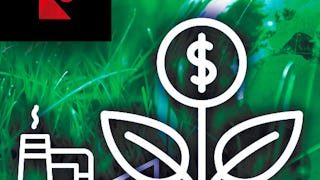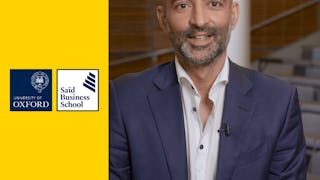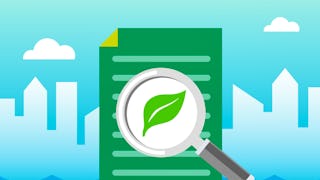As ESG investing continues to evolve, so do the funding mechanisms many companies, organizations, and governments use to finance their stated goals. Indeed, ESG-focused financial products, or ‘green assets’, have been growing in volume – as well as by type. In the fixed income space alone, instruments available to investors include green bonds, social bonds, sustainability-linked bonds, climate awareness bonds, gender bonds, and others – not to mention a growing list of ESG-themed exchange-traded funds (ETFs).

Enjoy unlimited growth with a year of Coursera Plus for $199 (regularly $399). Save now.

ESG-focused Financial Products
This course is part of ESG Investing: Financial Decisions in Flux Specialization

Instructor: Steven Levine
3,087 already enrolled
Included with
(15 reviews)
Recommended experience
What you'll learn
Describe various characteristics of green assets, including the supply, demand, and performance of green bonds.
Discuss how ESG fund flows have evolved.
Evaluate and compare certain ESG-themed ETFs
Explain the principles and frameworks behind the issuance of different ESG-related fixed income products.
Skills you'll gain
Details to know

Add to your LinkedIn profile
See how employees at top companies are mastering in-demand skills

Build your subject-matter expertise
- Learn new concepts from industry experts
- Gain a foundational understanding of a subject or tool
- Develop job-relevant skills with hands-on projects
- Earn a shareable career certificate

There are 6 modules in this course
This module centers on several types of green assets, including green bonds and social bonds, and the International Capital Market Association’s (ICMA) role in providing the driving principles behind their issuance. You should be able to explain who is selling these instruments, as well as some of the fixed-income related risks inherent in these types of products. Other green assets such as ESG-themed ETFs, and certain commodities are also introduced.
What's included
2 videos3 readings1 assignment2 peer reviews
This webinar, “The Global State of GSSS Bonds”, presented by James Cardamone, associate director of ESG product at FactSet-owned Truvalue Labs, takes a deeper look at some of the financial instruments associated with ESG investing – many of which have recently witnessed an increasing groundswell of supply and demand. Through this presentation, you should acquire a better picture of ESG-related fixed income products, such as green, social, sustainable, and sustainability-linked bonds, how to analyze them, and, ultimately, make better informed investment decisions. Among other topics, Cardamone explores the allure behind these fixed-income products, who is selling and buying them, how they differ from conventional bonds, and what purposes they serve within the ESG investing sphere.
What's included
3 videos3 readings1 assignment
“The Global State of GSSS Bonds” webinar continues with James Cardamone, associate director of ESG product at FactSet-owned Truvalue Labs, demonstrating green bond performance, the ‘greenium’ effect, and delves further into how to evaluate green bond issuers, as well as analyze their performance in the secondary market.
What's included
2 videos1 assignment
“The Global State of GSSS Bonds” webinar continues with James Cardamone, associate director of ESG product at FactSet-owned Truvalue Labs, addressing participants' questions about ESG scoring, and green washing – topics that will also be echoed in later lessons.
What's included
2 videos2 readings1 assignment1 peer review
The next series of videos introduces you to ESG-themed ETFs, another asset class in the sustainability-related space, including a broad overview by Ron DeLegge, founder of ETFguide and host of the series ETF Battles. In that introduction, DeLegge offers insights into how standards vary across these products, as well as presents four of the top US-listed ETFs by assets, which may be used to begin your research. DeLegge is then joined by two analysts, who compare and contrast three index-based, ESG-focused ETFs from iShares and Vanguard – with their evaluations formed on the bases of cost, exposure strategy, performance, and more – demonstrating how you can follow their analytical strategies for your own investing decisions.
What's included
2 videos1 assignment1 peer review
Readings in this module home in on the principles underlying different types of ESG-related fixed income products, examines certain specific bonds, as well as delves into certain government policy underpinning the rise of green asset supply, product diversity, and fund flows. We’ve also provided some commentary and research that addresses certain critical challenges of green bonds that you may factor into your analyses.
What's included
1 video12 readings1 assignment2 peer reviews
Earn a career certificate
Add this credential to your LinkedIn profile, resume, or CV. Share it on social media and in your performance review.
Instructor

Offered by
Explore more from Finance
 Status: Free Trial
Status: Free TrialInteractive Brokers
 Status: Free Trial
Status: Free TrialSaïd Business School, University of Oxford
 Status: Free Trial
Status: Free TrialInteractive Brokers
 Status: Free Trial
Status: Free TrialUniversity of Pennsylvania
Why people choose Coursera for their career




Learner reviews
15 reviews
- 5 stars
86.66%
- 4 stars
13.33%
- 3 stars
0%
- 2 stars
0%
- 1 star
0%
Showing 3 of 15
Reviewed on Dec 12, 2021
Excellent content on ESG bonds and ETFs! ESG 债券和 ETF 的优秀内容!Excelente contenido sobre ETFs y bonos ESG! Отличный контент про ESG-облигации и ETFs!
Reviewed on Oct 19, 2023
Great experience with courses and gain more insight about ESG products
Frequently asked questions
To access the course materials, assignments and to earn a Certificate, you will need to purchase the Certificate experience when you enroll in a course. You can try a Free Trial instead, or apply for Financial Aid. The course may offer 'Full Course, No Certificate' instead. This option lets you see all course materials, submit required assessments, and get a final grade. This also means that you will not be able to purchase a Certificate experience.
When you enroll in the course, you get access to all of the courses in the Specialization, and you earn a certificate when you complete the work. Your electronic Certificate will be added to your Accomplishments page - from there, you can print your Certificate or add it to your LinkedIn profile.
Yes. In select learning programs, you can apply for financial aid or a scholarship if you can’t afford the enrollment fee. If fin aid or scholarship is available for your learning program selection, you’ll find a link to apply on the description page.
More questions
Financial aid available,
¹ Some assignments in this course are AI-graded. For these assignments, your data will be used in accordance with Coursera's Privacy Notice.





